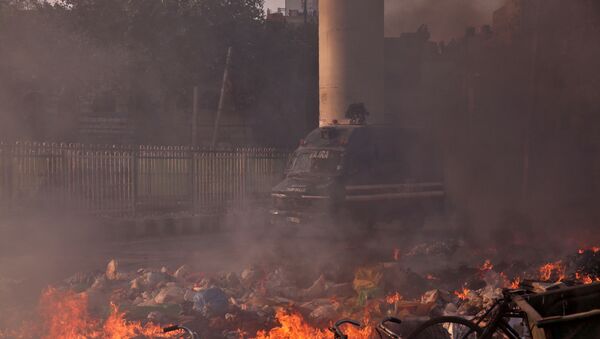As parts of India’s national capital city witnessed communal violence over the last few days, a Muslim man who is a paramilitary member, Mohammed Anees, also became its victim.
A resident of the Khajuri Khas area in riot-hit northeastern Delhi and Border Security Force (BSF) member Anees' house was set on fire during the three days of riots that included other incidents of arson and vandalism, media reported on Friday.
According to media reports, the rioters who burned down his house shouted and referred to Anees as a "Pakistani". Rioters were also believed to be asking Anees to “get his citizenship”. Sensing danger, Anees and three of his family members who were at home at the time fled for their lives. They were later rescued by the paramilitary forces.
The news has been making the rounds on social networking platforms in India.
BSF Jawan’s House Burned Down in Khajuri Khas by Rioters Shouting ‘Come Here Pakistani, Get Your Citizenship’ | @Zebaism reports. https://t.co/GMnXXRFW0q
— Aditya Raj Kaul (@AdityaRajKaul) February 28, 2020
Anees, who was set to get married in the house next month, has lost all of his life savings as the rioters burnt his house down in a predominantly Hindu neighbourhood.
However, Anees’ family has confirmed that none of their neighbours were involved in the attack.
Delhi became mired in violence after clashes erupted between proponents and opponents of the recently passed Citizenship Amendment Act (CAA) entitling non-Muslim immigrants from Pakistan, Afghanistan, and Bangladesh who entered India before 2015 to apply for citizenship.
Several shops, residences, places of worship, and vehicles have been vandalised since Sunday.
Earlier this week, the police officials who were posted in the areas of northeast Delhi were given "shoot on sight" orders in a bid to put a stop to the riots. School exams have also been postponed in the area.
Several opposition parties, civil rights organisations, and university students have launched protests against the citizenship law. They view it as discriminatory on religious grounds and against the secular credentials of India's Constitution. The federal government, however, vehemently rejected these charges saying the amended law offers citizenship to immigrants and does not affect current Indian's citizenship.


